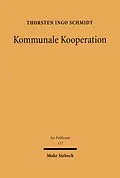German public law is, in the process of Europeanization, developing into a universal law of public corporations. The relations between citizens and the state but also the connections to organs of sovereign power cannot adequately be understood according to the traditional categories of administrative organization law. The law must be expanded into a modern law which includes public corporations.
German public law, which used to be characterized solely by categories of subordination, is, in the process of Europeanization, developing into a universal law of public corporations. The changes concern not only the relations between citizens and the state but also the connections to organs of sovereign power. The relations between them cannot adequately be understood according to the traditional categories of administrative organization law, which is hierarchically structured. The law must be expanded into a modern law which includes public corporations.
Autorentext
Geboren 1972; Studium in Göttingen; 1998 Promotion; 2004 Habilitation; 2006-09 Richter am VG Hannover; Professor für Öffentliches Recht, insbesondere Staatsrecht, Verwaltungs- und Kommunalrecht, an der Universität Potsdam; 2015-16 Richter im Nebenamt am OVG Berlin-Brandenburg.
Inhalt
Grundlagen kommunaler Kooperation
Bildung des Zweckverbandes und Hinzutreten weiterer Mitglieder
Mitglieder, Angehörige und Verbandsgerechtigkeit
Ausscheiden von Mitgliedern, Veränderungen des Zweckverbandes und besondere Organisationsformen
Interne Organisation des Zweckverbandes, Handlungsformen, Haftung und Vollstreckung
Finanz- und Wirtschaftsrecht des Zweckverbandes
Kontrolle des Zweckverbandes und prozessuale Stellung
Grenzüberschreitende Zusammenarbeit
Ergebnisse und Anhänge
German public law, which used to be characterized solely by categories of subordination, is, in the process of Europeanization, developing into a universal law of public corporations. The changes concern not only the relations between citizens and the state but also the connections to organs of sovereign power. The relations between them cannot adequately be understood according to the traditional categories of administrative organization law, which is hierarchically structured. The law must be expanded into a modern law which includes public corporations.
Autorentext
Geboren 1972; Studium in Göttingen; 1998 Promotion; 2004 Habilitation; 2006-09 Richter am VG Hannover; Professor für Öffentliches Recht, insbesondere Staatsrecht, Verwaltungs- und Kommunalrecht, an der Universität Potsdam; 2015-16 Richter im Nebenamt am OVG Berlin-Brandenburg.
Inhalt
Grundlagen kommunaler Kooperation
Bildung des Zweckverbandes und Hinzutreten weiterer Mitglieder
Mitglieder, Angehörige und Verbandsgerechtigkeit
Ausscheiden von Mitgliedern, Veränderungen des Zweckverbandes und besondere Organisationsformen
Interne Organisation des Zweckverbandes, Handlungsformen, Haftung und Vollstreckung
Finanz- und Wirtschaftsrecht des Zweckverbandes
Kontrolle des Zweckverbandes und prozessuale Stellung
Grenzüberschreitende Zusammenarbeit
Ergebnisse und Anhänge
Titel
Kommunale Kooperation
Untertitel
Der Zweckverband als Nukleus des öffentlich-rechtlichen Gesellschaftsrechts
Autor
EAN
9783161580383
Format
E-Book (pdf)
Hersteller
Digitaler Kopierschutz
Adobe-DRM
Dateigrösse
58.67 MB
Anzahl Seiten
730
Lesemotiv
Unerwartete Verzögerung
Ups, ein Fehler ist aufgetreten. Bitte versuchen Sie es später noch einmal.
